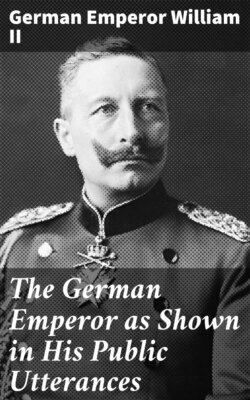Читать книгу The German Emperor as Shown in His Public Utterances - German Emperor William II - Страница 8
На сайте Литреса книга снята с продажи.
THE FIRST OFFICIAL ACT OF THE EMPEROR
ОглавлениеTable of Contents
Schloss Friedrichskron, June 15, 1888
The aged Emperor William I, grandfather of William II, departed this life March 9, 1888. He was succeeded by his son, Frederick III, who, after a reign of only a few months, died on June 15 of the same year. The present Emperor, who was born on January 27, 1859, was, therefore, twenty-nine at the time of his accession to the throne. It is characteristic that his first official act should have been an order to the army.
The close connection between the army and the Prussian Kings is a tradition which William II sedulously maintained. In later speeches he will frequently give evidence of this desire on his part and will quote characteristic sayings of his ancestors to the effect that the army is the “rocher de bronze,” that it is “the only pillar on which the empire rests.” He will repeat to the army officers that phrase of his grandfather: “These are the gentlemen upon whom I can rely.”
If the extraordinary versatility of William II is one of his most striking qualities, a reading of his speeches will convince us that it is none the less true that he is first and foremost a soldier. By far the great majority of his speeches are on military occasions, and it is the martial triumphs of his ancestors that he is most fond of commemorating. He seems to be most at home with his officers, and although at one time or another differences have arisen between him and every party or caste in the empire, even including the Prussian nobility, this close relationship with the army has never been clouded by even a momentary estrangement. More than any other one subject, army reviews have provided the occasion for his speeches. If but a few of these are given here it is because his sentiments in this regard have suffered no change and these addresses are largely repetitions of his sense of satisfaction and the expression of his good-will. That he intended to be the virtual leader of his own host is perhaps best indicated by the fact that Von Moltke (who was, to be sure, an old man) resigned six weeks after his accession to the throne. The present war has proved his capacity in this regard, and the army has certainly lost nothing in efficiency and has probably gained somewhat in confidence since he took over the direction from his ancestors and their advisers. The present order was issued on the very day of his father’s death. On that same date a somewhat similar proclamation was addressed to the navy.
THE EMPEROR IN THE YEAR OF HIS CORONATION, 1888
[Age 29]
Even ere you, my troops, had put aside the external signs of mourning for your Emperor and King, William I, who lives ever in your hearts, you are called upon to suffer another heavy blow through the death this morning, at five minutes past eleven, of my dear and deeply beloved father, his Majesty, the Emperor and King, Frederick III.
It is in these serious days of mourning that God’s will places me at the head of the army, and it is from a heart stirred deeply, indeed, that I address my first words to my troops.
I enter with implicit confidence, however, upon this duty to which God has called me; for I know what a sense for honor and duty has been implanted in the army by my glorious ancestors, and I know to what degree this sense has ever and at all times displayed itself.
The absolutely inviolable dependence upon the war lord [Kriegsherr] is, in the army, the inheritance which descends from father to son, from generation to generation. I would direct your gaze to my grandfather, who stands before the eyes of all of you, the glorious war lord, worthy of all honor—a spectacle more beautiful than any other and one which speaks most tellingly to our hearts; I would direct your gaze to my dear father, who even as Crown Prince won for himself a distinguished place in the annals of the army, and to a long succession of famous ancestors whose names are resplendent in history and whose hearts beat warmly for the army.
So are we bound together—I and the army—so are we born for one another, and so shall we hold together indissolubly, whether, as God wills, we are to have peace or storm.
You are now about to swear to me the oath of fidelity and obedience, and I vow that I shall ever be mindful of the fact that the eyes of my forefathers look down upon me from that other world and that I one day shall have to render up to them an account of the fame and the honor of the army.
William.
Castle Friedrichskron, June 15, 1888.
